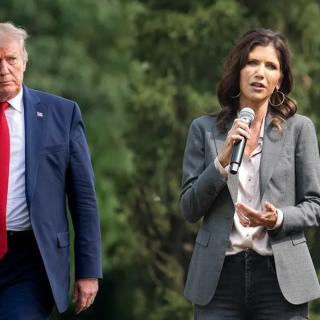Although Kevin Boyce’s tenure as Ohio treasurer from 2009-2010 was riddled with scandal, Boyce claims he knew nothing about the corruption carried out by his deputy treasurer, Amer Ahmad, who is now in federal prison. Boyce’s claim was called into question this year by federal Securities and Exchange Commission filings.
Those filings are against others and don’t charge Boyce with any legal violations. But the allegations in them, along with Boyce’s responses, deserve to be considered by voters in deciding whether to make Boyce a Franklin County commissioner in the November 8 election.
The filings involve State Street Bank and Trust Company. According to the SEC, the Massachusetts bank in early 2010 paid not only kickbacks to Ahmad but also contributions to Boyce’s campaign in return for lucrative state contracts to provide custody services for three Ohio pension funds.
The SEC says State Street’s vice president Vincent J. DeBaggis hired Ahmad’s friend Noure Alo as a purported lobbyist for the bank and paid him a monthly fee. But DeBaggis knew that Alo wouldn’t do any lobbying. Under the scheme, Ahmad awarded pension contracts to State Street, and Alo funneled a portion of his bogus lobbying fees to Ahmad as kickbacks.
Ahmad also made clear that to receive and keep the contracts, State Street needed to provide funds for Boyce’s 2010 campaign for state treasurer. DeBaggis sought help for this from State Street’s longtime lobbyist Robert B. Crowe.
So that Crowe could explain his fundraising ideas for the treasurer’s campaign, a meeting was held in Alo’s Columbus office on March 3, 2010. Present were DeBaggis, another representative of State Street, Crowe, Alo, Ahmad, Boyce, and Boyce’s chief fundraiser.
What the SEC says about the March 3 meeting
The meeting occurred when State Street and several other banks had bids in for the pension contracts but before the contracts were awarded. The SEC says: “At the meeting, Ahmad demanded that State Street make direct monetary contributions to the incumbent Treasurer’s campaign.”
SEC documents also indicate that in response to Crowe’s fundraising proposals, Ahmad “deemed the meeting ‘a waste of time,’ noting that ‘anybody can say we’ll throw a fundraiser for you. We want money.’”
The documents report that later the same day, DeBaggis emailed another State Street executive about contributions to Boyce’s campaign. He wrote: “Based on my meeting with [the Treasurer] today, we will need to find a way to do this.”
According to the SEC, Crowe then used illegal means to have $20,395 contributed to Boyce’s campaign within a matter of days. Less than three weeks later, Ahmad awarded State Street the three pension contracts worth millions in revenue for the bank.
Boyce’s initial response to the SEC allegations
After the SEC filed its documents on January 14, 2016, Boyce had no comment for a week, leaving his lawyer to say the SEC was wrong. As pressure built on Boyce to address the allegations personally, he met with the media on January 22.
Boyce told the reporters: “At no time was I ever in any type of meeting as described by the SEC in that complaint.”
After noting office emails and a calendar showing that Boyce set aside time for the meeting, a reporter asked if he had planned to attend and then decided not to. Boyce responded: “Honestly, it’s six years ago. And I can’t recall two months ago, let alone six years ago. . . . I just don’t recall why I did or did not attend the meeting.”
Boyce’s statements were taken to mean he had no recollection of the meeting and did not attend, and the SEC was wrong to say he was there.
Boyce’s story didn’t go over well, particularly in light of the office records showing he planned to attend and the attendees who said he was there. The Columbus Dispatch blasted his “curiously spotty” memory and “less than persuasive” claims in a January 26 editorial.
Boyce changes his story
When the SEC filed its documents, the law firm BakerHostetler was close to releasing its investigation report commissioned by the state government on the scandals in Boyce’s treasurer’s office. In an interview held less than two weeks after his press conference, Boyce gave the investigators a quite different story about the 2010 meeting.
The report says: “Boyce admits going to Alo’s office on March 3 but says that it was not a ‘meeting’ with any particular agenda. He acknowledges meeting Robert Crowe and someone else from State Street, and listening to Crowe’s introduction of his (Crowe’s) background and accomplishments. Boyce says that he did not understand the purpose of the meeting – that is, why people came to Alo’s office from near and far – but he just showed up as scheduled.”
Moreover, “Boyce says that he had a ‘snack’ and left after a brief introduction to Crowe and the other man. . . Boyce specifically denies any discussion of State Street wanting business or a demand for political contributions.”
This latest version is inconsistent with Boyce’s earlier position, but it fits better with the office records and the statements of others indicating he was at the meeting. And it allows Boyce to maintain he left before any discussion of pay to play.
After Boyce’s new version of events became public when BakerHostetler issued its report on February 5, 2016, he reverted to declining to answer questions about the meeting and leaving his lawyer to address them.
Boyce’s latest version depicts him as at least incompetent
Boyce’s conflicting statements obviously raise questions about his credibility on what transpired at the meeting. It’s hard to reject the SEC’s position in favor of someone whose stories contain significant inconsistencies that he refuses to explain.
Moreover, even if Boyce left the meeting before the pay-to-play discussions alleged by the SEC occurred, a competent and honest public official would have recognized major problems with the meeting itself and taken action. As the BakerHostetler report said, “the meeting never should have been scheduled.”
That’s because the attendees included: two representatives of a bank bidding for contracts to receive millions in revenue from the treasurer’s office, two lobbyists for the bank (one of whom was an experienced political fundraiser), Boyce’s chief fundraiser, the deputy treasurer, and Boyce. This gathering occurred less than a month before the treasurer’s office would select banks for the contracts and eight months before the election for state treasurer.
A meeting screaming “pay to play” more loudly would be hard to imagine, but Boyce claims he heard nothing. In saying he was again clueless about wrongdoing going on around him in government, Boyce gives voters another reason to question whether he is qualified to be a Franklin County commissioner.



